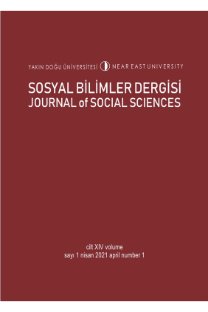Assessing the cypriot Mep’s performance: 2009-2011
Milletvekillerinin ne yaptıkları izlenebilirlik ve demokratik meşruluk gibi kavramlarla doğrudan ilgilidir. Sınırlı medya odağı olmasından dolayı çeşitli ülkelerdeki Avrupa Parlamentosu milletvekili üyeleri görevlerini yeterli görünürlük olmadan yürütmektedirler. Bu durum Kıbrıs Cumhuriyeti milletvekilleri içinde geçerlidir. Raporlar, görüşler, konuşmalar, düzeltmeler, sorular, değişiklik teklifleri, yazılı beyanlar ve katılım oranlarını hesaplayan bu çalışma, Kıbrıslı Avrupa Birliği milletvekillerinin performansını ölçmeyi amaçlamaktadır. Bunun yanında bu çalışmada milli çıkar odaklı aktivitelerin oranı ve milletvekillerinin bağlılıkları oy pusulasına bakarak değerlendirilmiştir. Bu makale Kıbrıslı milletvekillerinin performansını kendi arala¬rın¬da karşılaştırmanın yanında diğer Avrupa ülkelerinden gelen milletvekilleri ile de karşılaştırmıştır.
The visibility of what the Members of the Parliaments do has serious consequences for accountability and democratic legitimacy. The Members of the European Parliament from various countries conduct their affairs without much visibility as a consequence of limited media focus on the European Parliament. Among these countries one can name the Republic of Cyprus. By relying on the number of reports, opinions, speeches, amendments, questions, motions for resolutions, written declarations, and attendance, this study aims to provide an assessment of Cypriot MEPs' performance so far. It also reports on the rate of activities motivated by national interest and looks at the voting behaviour to analyze loyalties. The paper includes a comparison between the Cypriot MEPs as well as a comparison of performance between the Cypriot MEPs and other MEPs.
___
Beetham, D. (1994). Democracy and Human Rights. Cambridge: Polity Press.Dahl, R. (1991). Democracy and its Critics. Yale: Yale University Press.
de Vreese, C. H., Banducci, S. A., Semetko, H. A. and Boomgarden, H. G. (2006). "The News Coverage of the 2004 European Parliamentary Election Campaign in 25 Countries". European Union Politics 7 (4) pp. 477-504.
European Parliament, http://www.europarl.europa.eu/activities/committees/ ho me.do?language=EN (June 21, 2011)
Gustavsson, S., Karlsson, C. and Persson, T. (2009). "Examining the Illusion of Accountability" in The Illusion of Accountability in the European Union, edited by Gustavsson, S., Karlsson, C. and Persson, T. New York: Routledge.
Hix, S., Noury, A., and Roland, G. (2007). Democratic Politics in the European Parliament. Cambridge: Cambridge University Press.
Lord, C. (2004). A Democratic Audit of the European Union. New York: Palgrave Macmillan.
Maier, M. and Tenscher, J. (eds.). (2006). Campaigning in Europe - Campaigning for Europe: Political Parties, Campaigns, Mass Media, and the European Parliament Elections 2004. Münster: Lit Verlag Berlin.
Majone, G. (1998). "Europe's 'Democratic Deficit': The Question of Standards". European Law Journal 4(1) pp. 5-28.
Mény, Y. (2002). "De la Démocratie en Europe: Old Concepts and New Challenges". Journal of Common Ûarket Studies 41 (l)pp. 1-13.
Moravcsik, A. (2002). "In Defence of the 'Democratic Deficit: Reassessing Legitimacy in the European Union". Journal of Common Market Studies 40 (4) pp. 603-624.
Moravcsik, A. (2004). "Is there a 'Democratic Deficit' in World Politics? A Framework for Analysis". Government and Opposition 39 (2) pp. 336-363.
Persson, T. (2009). "Civil Society Participation and Accountability" in The Illusion of Accountability in the European Union, edited by Gustavsson, S., Karlsson, C. and Persson, T. New York: Routledge.
Reif, K. and Schmitt, H. (1980). "Nine Second-order national elections - A Conceptual Framework for the Analysis of European Election Results". European Journal of Political Research 8 (1) pp. 3-44.
Schmitter, P. C. and Karl, T. L. (1991). "What Democracy is...and is not". Journal of Democracy 2 (3) pp. 75-88.
Vote Watch, http://votewatch.eu/index.php, 21.06.2011.
- ISSN: 1986-1303
- Yayın Aralığı: Yılda 2 Sayı
- Başlangıç: 2008
- Yayıncı: Yakın Doğu Üniversitesi
Sayıdaki Diğer Makaleler
George Lamming and V. S. Naipaul in the light of politics of postcolonialism
Assessing the cypriot Mep’s performance: 2009-2011
Düzenin yabancılaşması ya da bir tezin tarihsel kaderi üzerine bir deneme
İktisat biliminde kayıtdışı ekonomi araştırmaları üzerine
The central dome space composition in the Ottoman classical architecture
